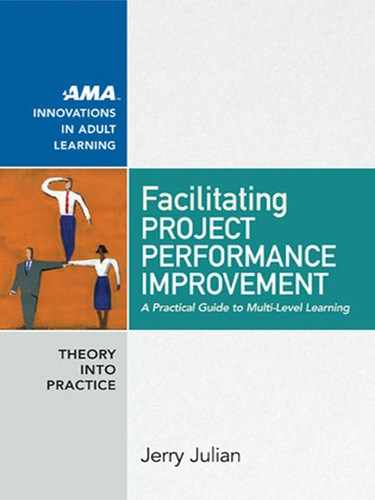The Project and Program Management Function (PMO) 117
American Management Association
www.amanet.org
THE PMO AND MULTI- LEVEL LEARNING
A number of conclusions can be drawn about the role of the PMO leader
and how he can contribute to facilitating cross- project learning and con-
tinuous improvement, components of multi- level learning that enable
continuous systems- level learning. Each of these conclusions is discussed
here, followed by recommendations for how PMO leaders can overcome
many of the barriers to continuous improvement.
The PMO Leader as Knowledge Broker
The rst conclusion drawn from the study is that PMO leaders are knowl-
edge brokers who facilitate connections among multiple communities in
order to facilitate learning from one project to the next. PMO leaders are
uniquely positioned to facilitate the deployment of re ective practices and
to embed this learning into future project activities for two reasons. First,
by virtue of their organizational position, PMO leaders are able to see
patterns across multiple projects and identify learning opportunities based
on those observations. Second, PMO leaders oversee the design and imple-
mentation of processes that are common to multiple projects, and, as seen
in this study, most of these practitioners have recognized the importance
of embedding lessons- learned practices into project methodologies within
their organization.
Transferring Improved Practices via Organizational Routines
The second conclusion is that organizational routines that can be utilized
by multiple projects can provide project organizations with a repeatable
way to generate and transfer learning from past project experiences. Previ-
ous theorists and researchers have identi ed organizational routines as a
means by which the collective know- how from previous experiences can
be embedded into the everyday work of organizational members (M. C.
Becker, 2005; M. C. Becker et al., 2005; Bresnen et al., 2005; Feldman &
Pentland, 2003; Szulanski & Jensen, 2004). As discussed in Chapter 1, how-
ever, project organizations present a unique challenge for organizational
learning because projects may be perceived as being “one- o ” or unique.
Moreover, project teams disband upon the completion of their work,
118 Roles
American Management Association
www.amanet.org
leaving no formal corpus behind to carry the learning to future activities.
This study demonstrates that organizational routines in the project man-
agement environment can help to overcome these challenges. Not only do
they provide a formal mechanism for lessons- learned practices, but they
can incorporate learning from past project experiences in the form of im-
proved project methodologies and templates that can be transferred to
future project teams.
Legitimacy and the Need for Social Capital
The third conclusion drawn from this study is that both the learning pro-
cess and the transfer of learning via organizational routines are shaped by
relations of power, requiring PMO leaders to attain a degree of social capi-
tal in order to facilitate cross- project learning e ectively. Project managers
and teams must factor in the interests of the PMO and the processes that
it requires when planning approaches to new projects. Likewise, the PMO
leader must factor in the interests of project managers and teams when
designing new or improved routines to ensure that they can be adopted
e ectively. When the PMO leader faces challenges to her legitimacy, both
the learning process and the transfer of learning via organizational rou-
tines can be undermined by the relative power of project teams and senior
management, both of which may be more worried about e ective out-
comes than about the processes by which these outcomes are achieved.
Defensive Routines Undermine Improvement
The fourth conclusion from this study is that defensive routines may dis-
tort or constrain organizational learning from projects, making it less
likely that future project teams will bene t from the experiences of previ-
ous teams. Under conditions of red- light learning, where the organization
focuses most of its formal re ective practices on failing projects, project
team members may be inclined to avoid embarrassment or threat and may
nd ways to divert attention to other, less threatening issues. As a result,
the learning that occurred at the individual or group level may not be ad-
equately represented, making it more likely that future project teams will
be required to “reinvent the wheel.”
..................Content has been hidden....................
You can't read the all page of ebook, please click here login for view all page.
